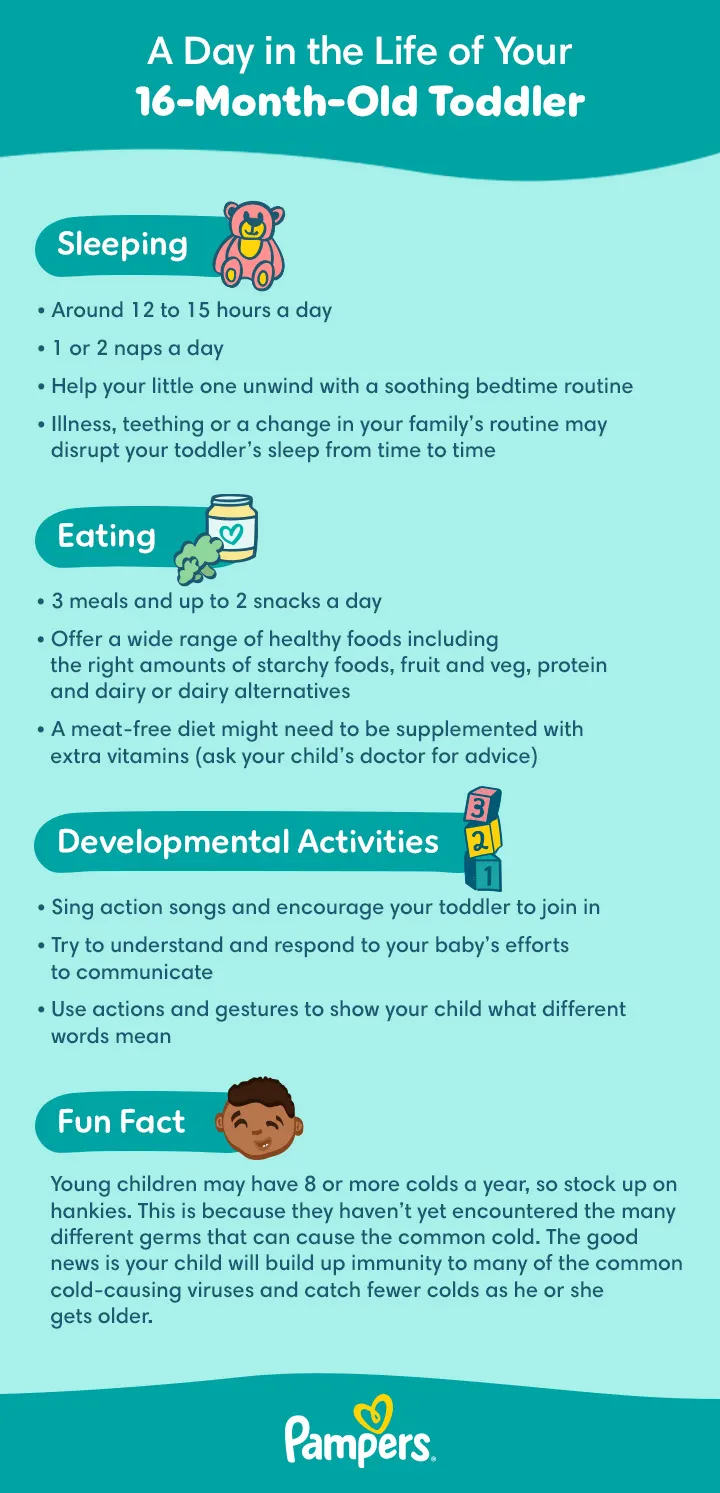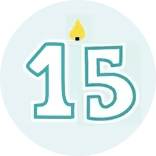16-Month-Old: Getting Ready to Talk
At around 16 months old, your toddler could still be babbling a lot, but proper speech may already be starting, or could be just around the corner. Learn more about this aspect of your toddler’s development, and what other exiting milestones might be coming up around this time.
Toddler Development Milestones
All children develop at their own unique pace, and your toddler is no exception. Here are some of the developmental milestones your 16-month-old may reach around this time:
Speech at 16 months old: Getting Chatty
You might be wondering how many words a 16-month-should be able to say. Well, this varies so much from child to child that there’s no precise answer. Your 16-month-old toddler may be able to say several words that you can understand and probably still ‘babbles’ a lot too.
Don’t worry if your 16-month-old is not ‘talking’ as much as other children around the same age – all children are different. If you have any concerns about your little one’s speech or and other aspect of your baby’s development, don’t hesitate to ask your health visitor for advice.
Cognitive Development: Learning by Imitation
Your 16-month-old may not be talking all that much yet, but there’s more to speech than just words. You might notice your toddler copying gestures and sounds from you or other people in your household.
If your toddler babbles a lot, the volume and intonation may also be sounding more and more like speech. For example, a string of baby words that rise in pitch towards the end might sound like a question. When your toddler points or gestures at the same time, you may even be able to figure out what he or she is trying to say without understanding the actual words.
Emotional Development: Clinginess
Although your child is becoming more and more independent all the time, you may have noticed that your 16-month-old toddler is still happiest when you’re close by, and sometimes has spells of clinginess.
If your toddler has separation anxiety he or she may be wary of strangers and become upset or even have a mini tantrum if you leave the room.
This behaviour may not be new – separation anxiety can start as early as 8 to 10 months, but it can peak sometime around 18 months old, so you might notice an increase around now.
It can be hard to leave a crying 16-month-old, but short separations are important for your toddler to learn that you will always return and be there for your little one. If you leave your toddler with someone while you nip out to the shops, be reassuring and talk to your toddler about all the things you’ll do together when you get back.
How to Support Your Toddler’s Development
One of the biggest milestones coming up for your toddler at 16 months old is learning to talk.
Here some ways you can encourage your toddler to talk:
Respond to your toddler’s efforts to communicate. When your toddler makes a gesture, points at things or makes sounds, try and figure out what your toddler is trying to say, and put it into words: ‘Do you want the teddy?’
Get down to your child’s level. Sitting, squatting or lying down to listen, talk and play with your little one makes it easier to communicate by putting you both at the same height.
Use actions with words. Don’t just say ‘bye bye’ – wave at the same time. Use gestures to accompany what you’re saying, for example say ‘up’ and move your hands upwards. Besides helping your child associate new words with their meanings, your toddler may also feel like joining in.
Sing action songs. One Potato, Two Potatoes and This Little Piggy Went to Market (or any of your other old favourites) – as well as action games like peek-a-boo – can be great fun for you both, and they also encourage communication and concentration.
Repeat yourself... a lot. Babies and toddlers learn speech by repetition, interaction and play, so repeating the same phrases while playing with your 16-month-old could help boost those language skills. For example, say ‘ready, steady go’ when starting a game, or ‘all gone’ once your toddler has posted every single block into a shape-sorting box.
How to Support a Bilingual Toddler’s Speech Development
If two or more languages are spoken in your family, don’t be worried that this will confuse your 16-month-old toddler. In fact, experts say that knowing more than one language can help with the development of speech.
The most important advice is for everyone in the family to talk to your child in the language they feel comfortable with. It might feel a little strange at first, but children are great at adapting to this. For bilingual parents, what better gift could you give your child than another language!
Mealtimes for Your 16-Month-Old Toddler
At 16 months old your toddler usually needs three meals a day, plus one or two snacks to tide him or her over between meals. Children don’t need salt or sugar added to their food. Sugar can harm your toddler’s brand-new teeth and salt isn’t good for little kidneys.
A healthy balanced diet for your toddler should include a variety of flavours and textures from the following food groups:
Fruit and vegetables
Starchy foods like bread, rice, pasta and potatoes
Milk and dairy products (or non-milk alternatives)
Protein foods, which can include fish, meat, eggs, beans and pulses.
Special Diets
If your family follows a vegetarian or vegan diet – or if your child has any food allergies or intolerances that mean important food groups, like dairy are off the menu – you may need to take extra care to make sure your 16-month-old toddler is getting the nutrients he or she needs.
If your toddler’s diet excludes all or certain animal products, it’s especially important to make sure he or she gets enough of these as part of a healthy balanced diet:
Protein. Non-animal sources of protein include beans and pulses, cereals like oats, rice and wheat), soya, seeds and nuts (but don’t give your toddler whole nuts to avoid the risk of choking) and – for non-vegans who eat them – eggs and dairy products.
Iron. Found in pulses, nuts, dried fruit such as raisins, wholegrains like brown rice, in dark green vegetables like broccoli and watercress and in iron-fortified cereals.
Calcium. Essential for growing strong bones and teeth, besides dairy products, your 16-month-old toddler could get calcium from fortified (unsweetened) soya and oat drinks, most leafy green vegetables, dried fruit, pulses, and brown, wholemeal and white bread.
Vitamin B12. This is only found in animal-based foods. If eggs and dairy products are included in your toddler’s diet they may provide enough vitamin B12. If not, foods like yeast extract spread, and breakfast cereals and soya products that are fortified with B12 could be an alternative source of this essential vitamin. Your child’s doctor may also recommend a vitamin B12 supplement.
Vitamin D. This vitamin is created by our bodies when we are exposed to natural sunlight, as well as being found in a small number of foods. Most of these are derived from animals. Fortified cereals may contain vitamin D, but vitamin D supplements are recommended even for adults and non-vegetarians during the autumn and winter, when there is less sunshine. Experts advise giving your toddler a daily vitamin-D supplement of 10 micrograms all year round until he or she is 4 years old.
Vitamin supplements
Vegan and vegetarian foods can be very filling because they contain more fibre than a meat-based diet. This means your child may feel full without having eaten all the nutrients, vitamins and calories needed to grow and thrive.
If this is the case, your toddler may need extra supplements. Talk to your child’s doctor about whether your child could need additional vitamin supplements.
How Much Sleep Does a 16-Month-Old Toddler Need?
Children’s sleep patterns vary a lot, so your toddler’s sleep schedule may be quite different from another toddler. Generally, at 16 months-old, your child may sleep anywhere between 12 and 15 hours in every 24-hour period, including 1 or 2 daytime naps.
You may find that your toddler is resistant to going to sleep at bedtime, especially if your little explorer has been having fun trying out some exciting new activity. Establishing a nightly bedtime routine, such as a relaxing bath followed by a soothing bedtime story, may help your little one settle more easily at night.
Other causes of occasional sleepless nights or temporary periods of sleep regression in your 16-month-old could include:
Illnesses. Coughs, colds and other illnesses that cause discomfort might make it difficult for your toddler to sleep soundly.
Teething. Painful or itching gums may keep your toddler awake sometimes. Rub your toddler’s gums with a clean finger or a cold wet flannel to soothe your teething toddler.
Changes in routine. Maybe you or your partner is returning to work, or your toddler is starting nursery school. Changes like this can disrupt your child’s sleep for a while.
A Day in the Life of Your Toddler
Here’s what a regular day with your 16-month-old toddler might look like in your home:
Your Toddler’s Health: Dealing With the Common Cold
At some point, your child is sure to come down with a cold, especially if your toddler (or a sibling) often mingles with other children at playgroup or nursery school.
Like many common childhood illnesses, there’s no medicine that prevents or cures the common cold. However, there are things you can do at home to keep your child comfortable until he or she gets better.
Colds usually clear up in five to seven days, although it can take longer. Here’s what to do if your child has cold or respiratory symptoms like a stuffy or runny nose, cough and/or fever:
Make sure your toddler gets plenty of rest and drinks plenty of fluid to prevent dehydration
Ask your pharmacist, health visitor or doctor about using saline nose drops to ease a stuffy nose
If your child has a fever (a high temperature over 38 degrees Celsius), use an over-the-counter fever medicine recommended by your doctor or pharmacist. Call 111 or your doctor if the fever lasts for five days or more or if you can’t bring it down.
Make sure everyone in the family washes their hands regularly to prevent the germs from spreading
A warm (but not scalding hot) honey and lemon drink can help soothe a sore throat (only give honey to babies over 12 months old)
Give your toddler lots of hugs and cuddles
Check in with your doctor if you’re worried about your toddler’s symptoms. Call 999 or visit your nearest A&E if your toddler has difficulty breathing or swallowing.
FAQs at a Glance
Your toddler will reach some milestones earlier or later than others, but around this time your 16-month old toddler may be able to do things like:
• Stack two or three blocks
• Scribble on paper with a crayon
• Point to familiar objects of pictures in books when you name them
• Recognise basic colours and shapes
• Stand up and walk unsteadily or with a push-along toy for support.
Your Life as a Parent: Making Comparisons
It’s natural for you to compare your child’s development with a child of a similar age and wonder why, for example, your toddler may be smaller, or not talking or walking as early or as much as others at 16-months-old or indeed any stage of childhood.
Try to remember that each child develops differently and at his or her own pace. Your toddler may be ahead in one area, but behind in others and vice versa. This is all a natural part of developing into a unique person.
It’s best to try not to compare your child to other children, or even to one of your older children who may have developed at a different pace.
Advice from other parents or well-meaning friends, relatives or strangers who may think they have all the answers is also best taken with a pinch of salt. Instead, talk to your health visitor or your child’s doctor if you do have any concerns about your child’s development.
Checklist for This Month
Update your first aid kit. No matter how carefully you’ve baby proofed your home and garden, sometimes minor bumps and scrapes are inevitable as your toddler becomes increasingly active and mobile. Now might be a good time to put together a baby first aid kit or update the one you’ve got. Check for out-of-date medicines or dressings and replace any that have been used up.
Check your toddler has enough seasonal clothes. Whether it’s winter or spring that’s just around the corner, your child may soon need larger sizes of seasonal clothes such as coats or shorts. Take advantage of any end-of-season sales and buy the next size up, too.
Fix up some playdates. It’s a good idea to schedule some playdates with other children of a similar age. You could meet up with some of the neighbourhood children or kids from your toddler’s nursery school at the local playground or park over the weekend. Besides being fun for your little one, this is a great opportunity to meet up with other parents, share parenting tips and form new friendships.
Switch the size and/or style of your toddler’s nappies. Check our nappy size guide to see if it might be time to jump up a nappy size. As your child becomes more mobile, you might like to try some easy-up nappy pants designed specially with active toddlers in mind.
Get more tips and information by signing up for our regular emails.
16 month old baby - checklist





